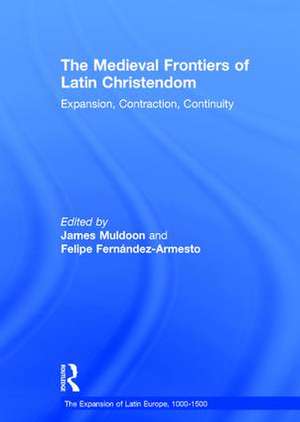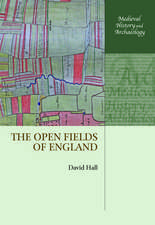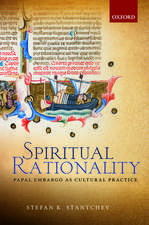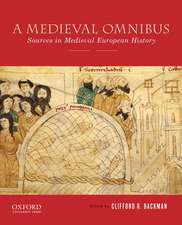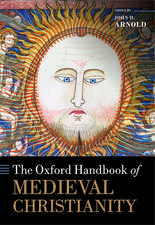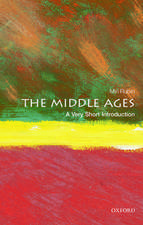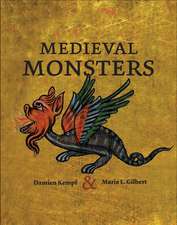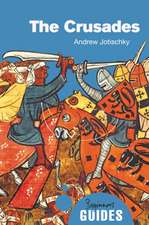The Medieval Frontiers of Latin Christendom: Expansion, Contraction, Continuity: The Expansion of Latin Europe, 1000-1500
Autor Felipe Fernandez-Armesto Editat de James Muldoonen Limba Engleză Hardback – 22 dec 2008
Preț: 1191.79 lei
Preț vechi: 1673.87 lei
-29% Nou
Puncte Express: 1788
Preț estimativ în valută:
228.04€ • 239.37$ • 189.28£
228.04€ • 239.37$ • 189.28£
Carte tipărită la comandă
Livrare economică 10-24 aprilie
Preluare comenzi: 021 569.72.76
Specificații
ISBN-13: 9780754659730
ISBN-10: 0754659739
Pagini: 418
Dimensiuni: 169 x 244 x 30 mm
Greutate: 1.01 kg
Ediția:1
Editura: Taylor & Francis
Colecția Routledge
Seria The Expansion of Latin Europe, 1000-1500
Locul publicării:Oxford, United Kingdom
ISBN-10: 0754659739
Pagini: 418
Dimensiuni: 169 x 244 x 30 mm
Greutate: 1.01 kg
Ediția:1
Editura: Taylor & Francis
Colecția Routledge
Seria The Expansion of Latin Europe, 1000-1500
Locul publicării:Oxford, United Kingdom
Cuprins
Contents: Introduction; Part 1 Expansion: The expansion of Europe I, William R. Shepherd; The American frontier - frontier of what?, Carlton J.H. Hayes; European colonial experience: a plea for comparative studies, Merril Jensen and Robert L. Reynolds; The significance of the frontier in the Middle Ages, Robert I. Burns; Medieval real estate developments and freedom, Bryce Lyon; Colonization activities in the Latin kingdom, Joshua Prawer; Missionary problems in the 13th century: a study in missionary preparation, Mathias Braun; Outsiders by birth and blood: racist ideologies around the periphery of medieval European culture, Richard C. Hoffmann. Part 2 Contraction and Redirection in the Late Middle Ages: The closing of the medieval frontier, 1250-1350, Archibald R. Lewis; The transfer of colonial techniques from the Mediterranean to the Atlantic, Charles Verlinden; The medieval; background of European and American oceanic history, Archibald R. Lewis; The Middle Ages in the conquest of America, Luis Weckmann; The Iberian background of Latin American history: recent progress and continuing problems, Charles Julian Bishko; The legacy of the Middle Ages in the American Wild West, Lynn White Jr. Part 3 Columbus: The pre-Columbian discovery of America, Jaime Cortesão; Christopher Columbus and his enterprise to the Indies: scholarship of the last quarter century, Delno West; European expansion before Columbus: causes and consequences, Seymour Phillips; The inter-Atlantic paradigm: the failure of Spanish medieval colonization of the Canary and Caribbean islands, Anthony M. Stevens-Arroyo; Index.
Notă biografică
James Muldoon is Professor Emeritus at Rutgers University, and Invited Research Scholar at The John Carter Brown Library at Brown University, USA. Felipe Fernández-Armesto is Professor of History at Tufts University, USA.
Descriere
This first volume in the series "The Expansion of Latin Europe" sketches the outlines of medieval expansion, illustrating some of the major topics that historians have examined in the course of demonstrating the links between medieval and modern experiences. It shows that European expansion began not in 1492 following Columbus's voyages but earlier as European Christian society re-arose from the ruins of the Carolingian Empire. The two phases of expansion were linked but the second period did not simply replicate the medieval experience. Medieval expansion occurred as farmers, merchants, and missionaries reduced forests to farmland and pasture, created new towns, and converted the peoples encountered along the frontiers to Christianity. Later colonizers subsequently adapted the medieval experience to suit their new frontiers in the New World.
